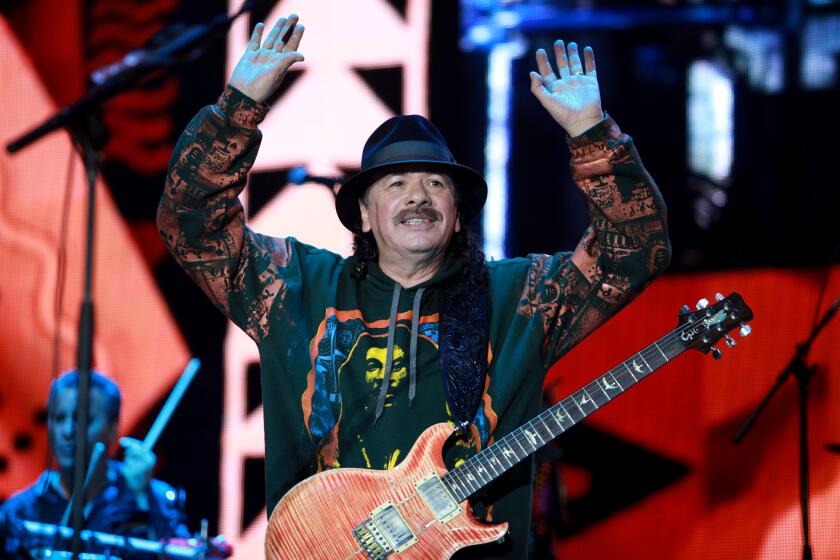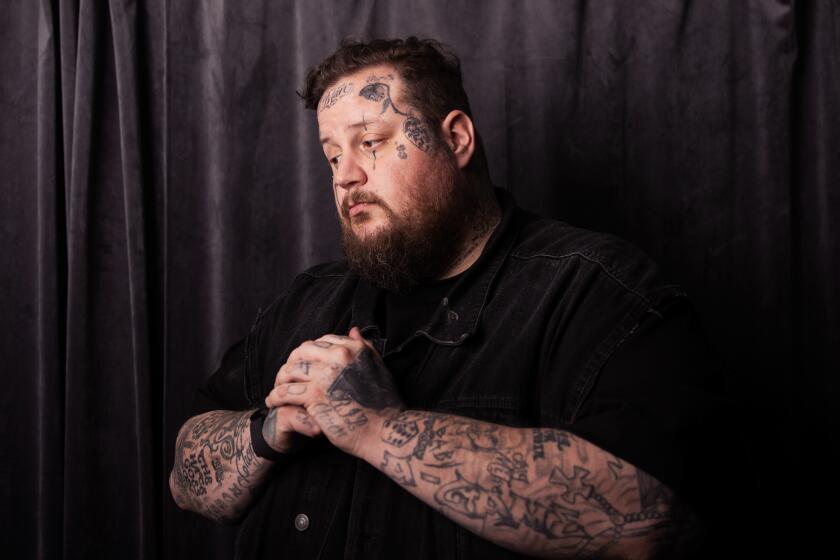Fulfilling the genius of Jaco
- Share via
Pat METHENY had it exactly right when he said that Jaco Pastorius was the “last jazz musician of the 20th century to have made a major impact on the musical world at large.”
That impact is vividly apparent to any musician who has picked up an electric bass over the past 20 years. Pastorius, quite simply, was the instrument’s Charlie Parker, both the source and the standard. No wonder that Victor Wooten recalls the first time he heard Pastorius as “the day I turned into a different bass player.”
Beyond his extraordinary instrumental virtuosity, Pastorius was a complete musician as well. His compositions include pieces that have become part of the jazz lexicon, and he was an imaginative arranger for various-size ensembles. His death in 1987 at age 35 was a tragedy, not just because it deprived jazz of one of its great performing artists but also because it meant that Pastorius’ bright promise as a composer would never be completely fulfilled.
A new album, “Word of Mouth Revisited” (Heads Up Records) by the Jaco Pastorius Big Band, affords compelling insights into the extent of that promise. Despite the name on the album cover, the ensemble is, in fact, a band led by Peter Graves that is essentially similar to the Florida-based unit that Pastorius spent five years with in the early ‘70s.
On the face of it, the project would seem to have minimal prospects for success. Why a big band album to celebrate the music of a seminal solo performer? For the very good reason that most of Pastorius’ career -- both as performer and writer -- was spent in richly textured musical environments, early on with Graves, later with Weather Report and finally with his own group, Word of Mouth.
Further enhancing the project, there is the presence of an astonishing lineup of gifted contemporary electric bassists: Wooten, Victor Bailey, Richard Bona, Jeff Carswell, Jimmy Haslip,Christian McBride, Marcus Miller, Gerald Veasley and Pastorius’ nephew, David Pastorius. Each has the opportunity to grapple with a Pastorius outing, including such originals as “Punk Jazz” and “Teen Town.”
The arrangements, aside from those written by Pastorius, were mostly provided by Larry Warrilow, who had worked closely with Pastorius planning and charting music during the years with the Graves band. And some of the tracks are introduced by Pastorius’ spoken-word fragments from early recordings.
It’s fascinating to hear the all-star bassists deal with fast-flowing Pastorius lines: Veasley driving through the jazz-rock groove of “Barbary Coast;” Bailey coming face to face with the full extent of Pastorius’ virtuosity on “(Used to Be a) Cha Cha” (which is introduced by Pastorius’ voice saying, “A little faster than what we did before but definitely slower than last night”); McBride’s articulate take on “Forgotten Love;” Haslip’s fast-lane romp through “Havona.”
But the most remarkable track is Herbie Hancock’s tune, “Wiggle Waggle,” in which Pastorius is the bassist. Producer Graves extracted the bass part from an earlier recording and redid all the instrumental parts -- a process somewhat like the combining of Natalie Cole’s voice with that of her father, Nat Cole, in the recording “Unforgettable.”
What makes the track so extraordinary is that Pastorius’ 30-year-old performance provides the album’s single most propulsive rhythmic passage. Filled with life, lifting the playing of the musicians 30 years later, it is a startling testimony to his musical genius.
*
Some more stand-up guys
Other current recommended albums featuring bass-playing leaders:
Avishai Cohen
“Lyla” (Razdaz)
This Israel-born bassist has always had too many eclectic interests to be boxed into a straight-ahead traditional jazz format. Now recording for his own label, he has an album reaching from drum and bass grooves (“The Watcher”) and a lyrical duet with Chick Corea (“Eternal Child”) to the atmospheric, hard-driving jazz of “The Evolving Etude” and Cohen’s poignant vocal on his own antiwar song, “How Long.”
Ron Carter
“The Golden Striker” (Blue Note)
Carter has made so many records in his long, productive career that you’d think he’d make a misstep somewhere along the way. But not this time. Working in the exceptionally empathetic company of guitarist Russell Malone and pianist Mulgrew Miller, he takes on an attractive collection of material, producing one winner after another. Among the high points: John Lewis’ lovely title tune, Carter’s quirky “New York Slick” and samba-tinged “Parade,” and the affecting Adagio theme from Rodrigo’s “Concierto de Aranjuez.”
Dave Holland
“Extended Play: Live at Birdland” (ECM)
Holland has been receiving rave notices in recent years, not just as a bassist but as a leader, a composer and an arranger as well. And for a lot of good reasons, all of which are apparent in this two-CD set, recorded in 2001 at Manhattan’s Birdland jazz club. Accompanied by his regular group, with its texturally appealing instrumental combination of saxophone, trombone, vibraphone, bass and drums, Holland leads the way through a set of extended performances (with especially impressive work from saxophonist Chris Potter). Almost but not quite as good as being there, the recordings present world-class jazz in its natural state, unrestricted by either the time demands or the environmental distractions of the studio.
More to Read
The biggest entertainment stories
Get our big stories about Hollywood, film, television, music, arts, culture and more right in your inbox as soon as they publish.
You may occasionally receive promotional content from the Los Angeles Times.










